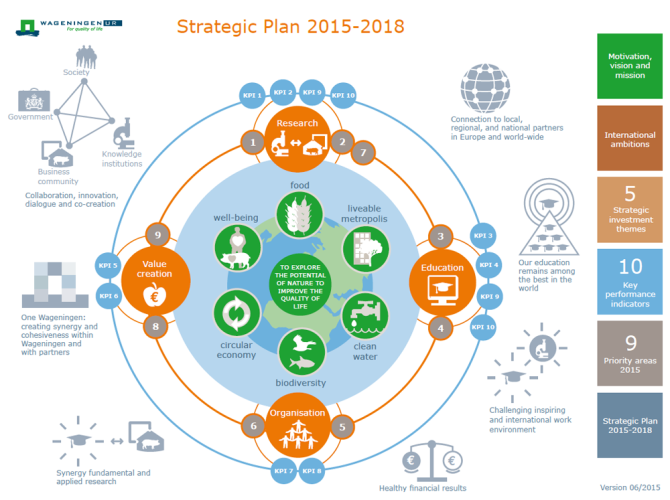
Press release
New Strategic Plan for Wageningen UR
More dialogue with society, multidisciplinary working, cross-pollination between fundamental and applied research and between the university and research institutes, plus education geared to life-long learning. These are a few of the key points from Wageningen UR's new strategic plan.
With the Strategic Plan 2015-2018, Wageningen UR aims to play the role of a catalyst in issues facing global society, such as the provision of adequate and safe food, climate change, the development of a circular economy, protecting and utilising biodiversity and reducing poverty. At the same time, Wageningen UR will also more explicitly use its role as a partner to strengthen the European and international role of the Netherlands in these areas.

Research
Wageningen UR will be investing in five new strategic investment themes: health of people, animals and plants (A Global One Health); more sustainable and efficient systems for production and consumption (Resource Use Efficiency); research into the resilience of ecosystems and economic and social systems (Resilience); solutions for quality of life in metropolitan areas (Metropolitan Solutions); and developing new biological systems (Synthetic Biology). These themes have international scope. Moreover, within these themes, the combination of fundamental and applied research is indispensable and the Wageningen approach of integrating the natural and social sciences really comes into its own.Education
The curricula offered will become better geared to life-long learning and will gain greater coherence. Alongside teaching on Wageningen Campus, in the coming years more teaching will be offered online, from individual educational elements to complete master’s degree programmes. Additionally, so-called double and joint degrees will be developed with Dutch and international universities. In this way, the small-scale nature and quality for which Wageningen University is known will be preserved even with growing student numbers. Furthermore, possibilities for establishing an MBA for Food Chains, English-language bachelor’s programmes and advanced teacher training programme are being examined.
Value creation and innovation
In order to better connect science with society, Wageningen UR will be setting up the ‘Wageningen Dialogues’. These are online and real-life opportunities to enter into discussion about the most important issues and developments in society. In order to promote economic value creation and innovation, Wageningen UR will be making expertise, equipment and research facilities more easily accessible to SMEs and R&D departments of companies and other knowledge-intensive organisations at home and abroad. Additionally, Wageningen UR will be investing in collaborations with partners from the local to the global level.
Organisation
In order to be able to make a bigger contribution to the biggest problems facing the world, Wageningen UR will be putting more energy into synergy and flexibility within the organisation over the coming years. A culture of working together, sharing knowledge, entrepreneurship and customer focus must become part of the fabric of the organisation even more than it is already. Wageningen UR also wants to be a socially responsible and efficient organisation, within which we develop talent from all over the world. The aim is for Wageningen UR to generates as much energy as it consumes by 2030, thus being fully energy-neutral.